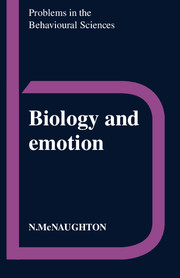Book contents
- Frontmatter
- Contents
- Preface
- Acknowledgements
- 1 Emotion since Darwin
- 2 Releasers and state-dependent reflexes
- 3 Purpose and emotion
- 4 Expression: a window on the emotions?
- 5 Are physiological changes epiphenomena of emotion?
- 6 Somatic influences on the emotions
- 7 Optimal foraging and the partial reinforcement effect: a model for the teleonomy of feelings?
- 8 Do emotions mature or differentiate?
- 9 Cognition, learning and emotion
- 10 Interaction of the components of emotion
- 11 Of mice and men
- 12 Biology and emotion: some conclusions
- Glossary
- Notes
- References
- Index
6 - Somatic influences on the emotions
Published online by Cambridge University Press: 05 August 2012
- Frontmatter
- Contents
- Preface
- Acknowledgements
- 1 Emotion since Darwin
- 2 Releasers and state-dependent reflexes
- 3 Purpose and emotion
- 4 Expression: a window on the emotions?
- 5 Are physiological changes epiphenomena of emotion?
- 6 Somatic influences on the emotions
- 7 Optimal foraging and the partial reinforcement effect: a model for the teleonomy of feelings?
- 8 Do emotions mature or differentiate?
- 9 Cognition, learning and emotion
- 10 Interaction of the components of emotion
- 11 Of mice and men
- 12 Biology and emotion: some conclusions
- Glossary
- Notes
- References
- Index
Summary
The restless violence of the senses impetuously carries away the mind of even a wise man striving towards perfection
Bhagavad Gita: 2-60Do physiological changes determine emotion?
Introspection suggests that we perceive some fact and evaluate it; that this evaluation results in an emotional state which causes us to act; and that this emotional state is then accompanied or followed by specific feelings. As was discussed in Chapter 1, James (1884) suggested ‘on the contrary … that the bodily changes follow directly the perception of the exciting fact, and that our feelings of the same changes as they occur is the emotion’ and this has been taken to imply that emotional behaviour would not occur in the absence of feeling.
Cannon (1927) proposed a number of objections to James's position which are at the heart of much of the research we will discuss:
Total separation of the viscera from the CNS does not alter emotional behaviour.
The same visceral changes occur in very different emotional states and in non-emotional states.
The viscera are relatively insensitive structures.
Visceral changes are too slow to be the source of emotional feeling.
Artificial induction of the visceral changes typical of strong emotions does not produce them.
- Type
- Chapter
- Information
- Biology and Emotion , pp. 67 - 76Publisher: Cambridge University PressPrint publication year: 1989

